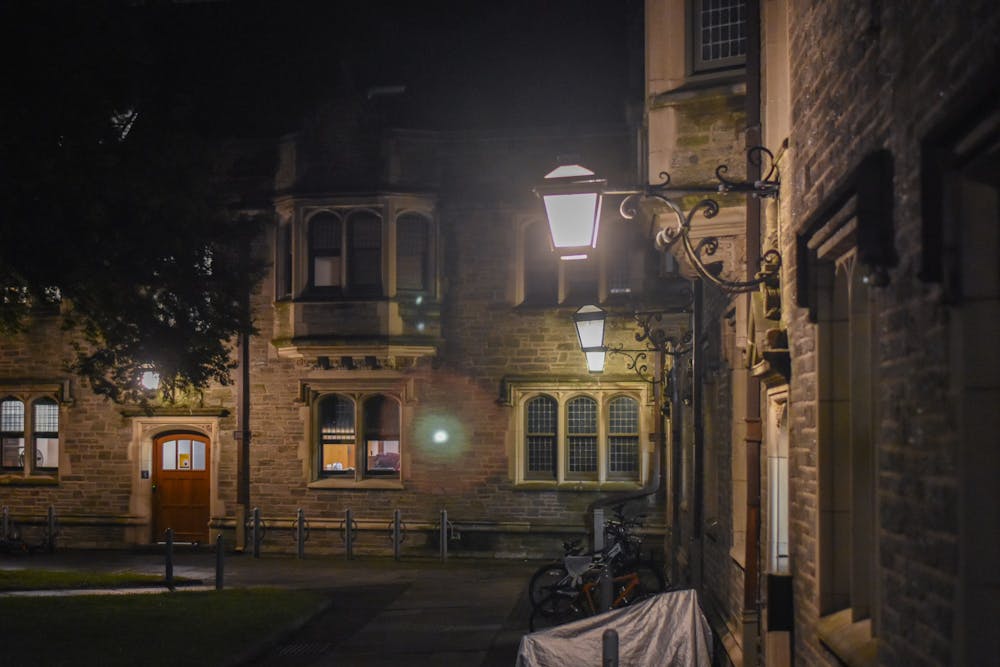Content Warning: The following article includes mention of student death and suicide. University Counseling services are available at 609-258-3141, and the Suicide Prevention Lifeline is available 24/7 at 988 or +1 (800) 273-TALK (8255). A Crisis Text Line is also available in the United States; text HOME to 741741. Students can contact residential college staff and the Office of Religious Life for other support and resources.
According to a memo sent to students, staff, and faculty on March 8, additional security cameras will be installed “at all exterior doorways in undergraduate residential college buildings and dorms,” in accordance with recommendations from the Environmental Safety and Risk Management (ESRM) committee. The memo adds that the cameras are expected “to be installed and online by the start of the fall 2023 semester,” and that no cameras will be “installed in any other undergraduate residential areas” including “restrooms, hallways, private rooms, or residential college lounges.”
According to the ERSM webpage, the committee covers environmental health and safety issues and “is responsible for developing policy and procedures to improve oversight of these areas.”
Campus security has come under increased scrutiny this year, stirred by the passing of Misrach Ewunetie ’24 on campus last October. While the cause of Ewunetie’s death has since been ruled a suicide, suspicions at the time surrounding the circumstances of the incident made safety a focus of ongoing campus conversation. Ewunetie was found dead at the edge of campus more than six days after she was last seen, after an intensive five-day search.
In November, the University announced several goals to reinforce security, including limiting access to residential buildings, expanding surveillance, and increasing campus lighting.
Since it was initially proposed, the security camera project has sparked controversy. When floated at a feedback session with the Department of Public Safety (DPS) in November, many students argued that increased surveillance would infringe on the privacy of students and staff.
“There is kind of a lack of trust in that [there is little faith that] the administration would not violate students’ privacy,” Seth Kahn ’25 said at the feedback session.
The FAQs shared with the student body made note of a number of safeguards against misuse of security camera footage. According to the memo, the cameras’ “primary intended use is to help in emergency situations and post-incident investigations; the cameras will generally not be monitored in real-time.”
The FAQs also note that “face blurring technology will be automatically deployed to ensure that only authorized investigators may view faces in security camera recordings” and that the cameras will not record audio.
According to the FAQs, footage may be preserved to investigate “a possible violation of law or University policy.” When asked for comment on the scope of University policy violations that may be investigated using surveillance footage, the University referred The Daily Princetonian back to the language in the FAQs which states that footage may be distributed to University officials investigating emergency situations and violations of University policy at the approval of the Executive Vice President or their designee.
Executive Vice-President Treby Williams ’84, the University official who would decide on the release of security footage, announced her resignation in late January. With her term ending in June, her replacement has yet to be announced.
In response to concerns that the cameras may be used to monitor non-violent policy offenses, Assistant Vice President for Public Safety Kenneth Strother Jr. said in November that Princeton’s Public Safety does not “self-initiate” such reports, though noted cameras could be used to corroborate reports.

The memo, signed by several high-ranking University administrators, notes that the University “strives to provide a safe and secure campus environment for all members of our community.”
According to the project’s FAQ page, installations will begin later this month and are expected to conclude by the fall 2023 semester. Residents and residential college staff will be notified before cameras are added to their building, and installations will be scheduled to minimize disruptions, with consideration for factors such as the academic calendar’s “exam periods and major events.”
The memo reiterated that the ESRM committee has convened a working group, whose short and long-term goals are available online, to examine exterior lighting across campus, a proposal that has received broader support. The memo did not offer an update on improvements to lighting on campus.
On March 7, the Director of Campus Safety and Health, Kelly States, addressed the Undergraduate Student Government (USG). In her presentation, States said that campus lighting governance is “complicated,” citing difficulties coordinating with the many departments and units concerned and sharing limited information on the working group’s progress.
Tess Weinreich is an associate News editor for the ‘Prince.’
Please direct any corrections requests to corrections[at]dailyprincetonian.com.








